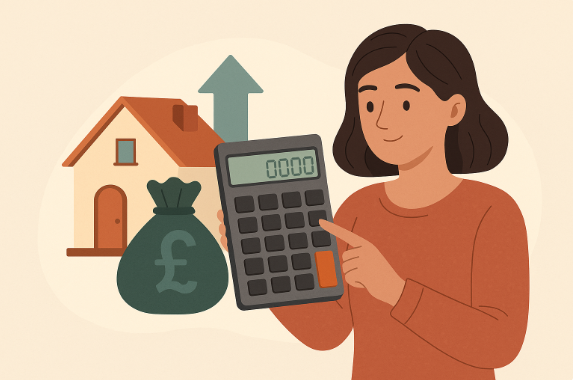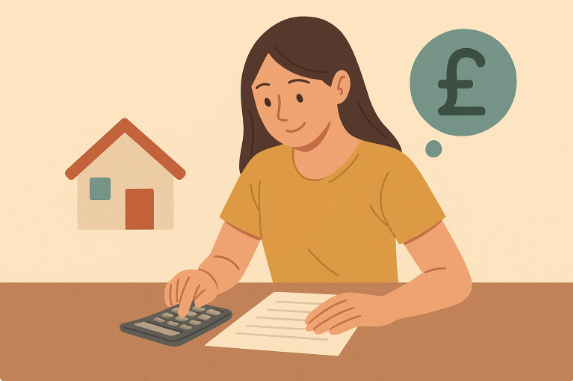Buying a home is one of the biggest financial steps most of us take, and the first question that usually pops up is: “Mortgage Calculator How Much Can I Borrow?” That’s where a mortgage calculator comes in handy. It gives you an estimate of what lenders may be willing to offer based on your income, expenses, and deposit.
In this UK guide, we’ll break down exactly how a mortgage calculator works, what affects your results, and how you can use it to plan your home purchase.
What is a mortgage calculator and how does it work in the UK?
A mortgage calculator is an online tool that helps you estimate how much you can borrow for a home loan. In the UK, lenders use affordability checks, but calculators give you a quick preview before you apply.
How lenders use affordability calculators
-
Lenders want to make sure you can afford repayments without financial stress.
-
They assess your income, debt, and living expenses against their lending criteria.
-
Most lenders also apply a “stress test” – checking if you could still afford payments if interest rates rise.
What information do you need to enter?
-
Annual income (single or joint)
-
Deposit amount
-
Monthly debts (loans, credit cards, childcare)
-
Regular expenses (utilities, transport, subscriptions)
Why mortgage calculators are only an estimate
A calculator gives you a ballpark figure, not a guarantee. Every lender has slightly different rules, so the amount can vary between banks and building societies.
How much can I borrow with a mortgage calculator in the UK?

You’ve probably heard people say you can borrow “about 4 to 4.5 times your salary.” That’s true in many cases, but there’s more to it.
What role does your income play in mortgage affordability?
-
Higher income usually means higher borrowing potential.
-
Joint incomes can significantly increase your limit.
-
Lenders also look at whether your income is stable and regular.
How do debts and monthly expenses reduce borrowing power?
-
Student loans, car finance, or credit card debt lower the amount you can borrow.
-
Higher monthly outgoings mean lenders will cap your mortgage lower.
Can your credit score affect how much you can borrow?
Yes. A strong credit score can open up better mortgage deals and higher borrowing amounts, while a poor score may reduce offers.
Do different lenders calculate borrowing differently?
Absolutely. One bank may lend 4x your income, while another could stretch to 5x if your finances are strong. That’s why comparison matters.
What factors affect the results of a mortgage calculator?
Does the size of your deposit change your borrowing limit?
Yes, because a larger deposit reduces the lender’s risk. For example:
-
5% deposit = fewer lenders and stricter rules
-
10–20% deposit = better rates and higher borrowing potential
How do interest rates impact mortgage affordability?
-
Higher rates mean bigger monthly repayments, which reduce how much you can borrow.
-
Lower rates make mortgages more affordable and increase borrowing capacity.
Can your employment type influence results?
-
PAYE employees usually find it easier since income is stable.
-
Self-employed applicants may need two or more years of accounts.
-
Contractors or freelancers often face stricter checks.
How do lenders consider household bills and lifestyle costs?
They’ll include things like:
-
Council tax
-
Utilities
-
Transport
-
Everyday spending habits
How can I use a mortgage calculator to plan my home purchase?

Should I use a mortgage calculator before speaking to a broker?
Yes, it’s a smart first step. It helps you understand what’s realistic before you start house-hunting.
How do I compare results from different calculators?
-
Try several calculators from banks, building societies, and comparison sites.
-
Note that each one may give a slightly different estimate.
-
Use the lowest and highest figures to set realistic expectations.
What steps should I take after seeing my borrowing estimate?
-
Review your budget and monthly expenses.
-
Think about deposit size and how much you can realistically save.
-
Speak to a mortgage broker for tailored advice.
What is the difference between a mortgage calculator and a mortgage in principle?
A mortgage calculator and a mortgage in principle (AIP) are related but not the same. A calculator gives you a quick estimate, while an AIP is a more reliable confirmation from a lender.
What does a mortgage in principle mean in the UK?
A mortgage in principle is an agreement from a lender that, based on the details you’ve shared, they may be willing to lend you a certain amount.
-
Shows sellers and estate agents that you’re a serious buyer
-
Usually valid for 60–90 days
-
Not a guarantee of a mortgage, but stronger than a calculator estimate
A calculator gives a rough idea, while an AIP involves more checks, making it more accurate.
-
Mortgage calculator: Quick estimate, no credit check
-
Mortgage in principle: Includes credit check, closer to the real figure
-
AIP is more trusted by estate agents during property negotiations
Do lenders always honour the borrowing figure given in a calculator?
No, because calculators don’t see your full financial picture. Once you apply, lenders look deeper.
-
They review your payslips, bank statements, and debts
-
Lifestyle spending and childcare costs can reduce borrowing
-
Sometimes the final approved amount is higher, but usually it’s lower than the calculator’s top figure
How can first-time buyers use a mortgage calculator effectively?

First-time buyers can benefit a lot from mortgage calculators, but they should also be aware of extra rules and schemes that affect borrowing.
What should first-time buyers know about affordability rules?
Lenders tend to be cautious with first-time buyers, so expect extra checks.
-
Income stability is very important
-
A clean credit record makes approval easier
-
Monthly outgoings (e.g. subscriptions, car finance) are closely reviewed
How do government schemes affect borrowing?
Government-backed schemes can change how much you need to borrow, making it easier to get on the ladder.
-
Help to Buy: Offers equity loans to boost your deposit
-
Shared Ownership: Lets you buy part of a property and pay rent on the rest
Both reduce the initial borrowing required, even if your salary is modest
How can budgeting alongside a calculator improve your chances?
Budgeting helps you understand what you can comfortably afford, not just the maximum a lender might allow.
-
Track income and expenses for 3–6 months before applying
-
Cut unnecessary spending to strengthen your application
-
Show consistent saving habits to prove financial responsibility
What are the limits and drawbacks of a mortgage calculator?
Why calculators can’t predict lender decisions exactly
They don’t factor in:
-
Detailed spending habits
-
Future interest rate changes
-
Unique lender policies
Common mistakes people make when using them
-
Assuming the maximum estimate is guaranteed
-
Forgetting to include debts and expenses
-
Not checking with multiple lenders
When should you speak to a mortgage broker instead?
-
If you’re self-employed or have complex finances
-
If you want to know which lender is most likely to approve you
-
To get access to exclusive deals not shown in calculators
Example of “How Much Can I Borrow” Scenarios in the UK
| Annual Income | Deposit Size | Possible Borrowing (Estimate) | Notes |
|---|---|---|---|
| £30,000 | 10% | £120,000 – £135,000 | Single applicant |
| £50,000 | 15% | £200,000 – £230,000 | Single applicant |
| £70,000 | 10% | £280,000 – £320,000 | Joint applicants |
| £100,000 | 20% | £400,000 – £450,000 | Joint applicants, good credit |
Conclusion: Mortgage calculator how much can I borrow in the UK?
A mortgage calculator is a great starting point to answer the big question: “How much can I borrow in the UK?” It helps you set realistic expectations, plan your budget, and narrow down property searches.
But remember:
-
Calculators are only an estimate.
-
Your income, deposit, credit score, and spending all affect results.
-
The real figure depends on lender checks.
The best approach is to use calculators to guide your planning, then speak to a broker or lender for personalised advice.
FAQs on Mortgage Calculator How Much Can I Borrow UK
Is a mortgage calculator 100% accurate in the UK?
No, it’s just an estimate. Lenders may offer more or less depending on your full financial picture.
How many times my salary can I borrow for a mortgage?
Most UK lenders offer between 4x and 4.5x your income, but it depends on your situation.
Can self-employed people use a mortgage calculator?
Yes, but lenders will want to see proof of income, usually 2–3 years of accounts.
Do joint mortgage calculators give a higher borrowing figure?
Yes, combining incomes usually increases borrowing potential.
How much mortgage can I borrow based on salary?
Typically, 4–4.5 times your salary, depending on debts and credit score.

I’m Adam Milne, a business writer and co-author at UKBusinessMag.co.uk. I’m passionate about simplifying complex topics—whether it’s tax, startup strategy, or digital marketing—so that entrepreneurs can take action with confidence. With years of experience in small business consultancy, I bring a practical perspective to every piece I write, helping readers turn ideas into results.



